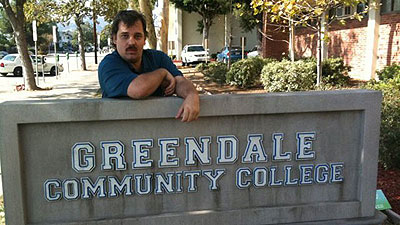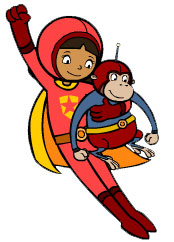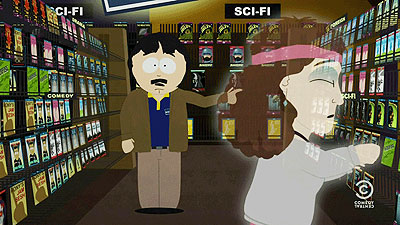TV Is Dead, Long Live TV: December 7, 2012
Published on December 7th, 2012 in: Media, Science and Technology, Streaming, The Internets, TV, TV Is Dead Long Live TV |By Elizabeth Keathley
In his keynote speech to the XOXO Festival this past September, Dan Harmon, creator of Community, had this to say about the death of television:
“You don’t want to monetize the Internet. You’re having fun right now because it can’t be monetized. You’re getting away with murder on the Internet. You’re doing wonderful Rodenberry-ish things on the Internet because it has eschewed money and all the crappy people are back on TV wasting everyone’s time while Rome burns to the ground.”
I disagree with Harmon about several things he said in this speech, but I’ll start with the money thing because it’s so easy to disprove.

Dan Harmon created a great television show, but now says TV is dead.
A video of his speech is at the end of this article.
This week Disney made a lot of money from the Internet, selling streaming rights to its back catalog to Netflix, and Netflix is monetizing the Internet just fine. For those who pay a monthly Netflix fee, no more scouring public library catalogs to find a copy of The Black Cauldron, no more waiting for Disney’s marketing division to decide when a classic could be offered for sale without competing with new studio offerings.
As Alyssa Rosenberg pointed out so well on ThinkProgress, making Disney content available to Netflix subscribers solidifies the growing number of parents who see cutting cable as a good way to curb their children’s exposure to other media. Now that you can safely hit play on a variety of well-known children’s content through Netflix, many will cut the cord to the playroom, at least. The Disney catalogs simply round out the already great offerings of contemporary children’s programming on Netflix—Snow White and Sleeping Beauty will join WordGirl, The New Electric Company, and My Little Pony as viewing options. Children who now have only Netflix to choose from will be able to watch this Disney fare alongside Beakman’s World, the 1980s Transformers cartoon, and any National Geographic special from any decade they would like.

If you haven’t watched WordGirl and her sidekick,
Captain Huggyface, you’re missing out.
It’s worth noting here that the Netflix acquisition deprives cable channel Starz of the right to stream Disney content. This could be seen as a slap back at Starz for playing strangely with its Netflix licensing deal last year. Previously, any Disney content you saw on Netflix came through Starz, which also holds the rights to such Netflix faves as Party Down.
Disney has its own channel you can subscribe to without cable— although the Disney channel on Roku is just a promotional channel, the same one you get inside Disney hotels. It simply runs commercials for Disney content, and is literally the minimum Disney could do to provide access outside of cable. My guess is that by 2016 all current Disney contract in play will have been updated to include provisions that will allow the studio to launch its channel free of cable. Why 2016? That’s when Netflix will get the rights to start streaming current Disney product alongside the library rights they have now. At that point, Disney will likely be using Netflix for the rental market, and its own online streaming ap for television. Disney knows cable/linear television is dying, and they’re positioning their licensing rights in that direction.
Meanwhile, Verizon is busy inventing new ways to alienate the cable subscribers they still have. Using facial recognition technology, Verizon’s new cable box may soon be able to monitor television watchers. If there’s someone at Verizon that really needs to know I do needlework shirtless while I watch Sons of Anarchy, I guess they’ll soon have the ability to do that. Verizon also owns part of Redbox, which is what remains of mainstream video rental in many markets. If you haven’t seen the brilliant South Park comment on the current video rental market that was their Halloween episode, I recommend you watch it on Hulu right away. As part of the adventure, thieves repeatedly break into Redbox machines only to find them empty. I guess Verizon’s television division still thinks that in the next five years people will A) not only continue to subscribe to cable, but be OK with the home invasion of a camera they can’t control and B) continue to rent movies even as they become more easily available online.

The ghost of video rentals past haunts the 2012 South Park Halloween episode, available for viewing on Hulu.
In the same speech in which Dan Harmon said the Internet can’t be monetized, he also opined that television peaked in the 1980s. I can’t disagree more—television today is full of much better acting, writing, and production values than we’ve ever seen. I would hold any episode of Harmon’s Community up against episodes of The Cosby Show. Further, the diversity and quality of content available off networks continues to surprise me, weather it’s the tension conveyed through The Booth at The End on Hulu or the slapstick enjoyment of the many web comedy series available. I would hazard that FunnyorDie.com has just as many viewers at this point as Saturday Night Live—and both reach more people than SNL did in its first season.
Television is only dead if we think of it as linear, scheduled viewing of content brought to us by fairly homogenous corporations. Television is very much alive if we recognize the new Internet reality of content delivery. I think Harmon was right on in his talk about threshold guardians who don’t understand TV ruining it. I just think that TV is alive and well on the Internet.
Harmon also says that what will ruin Internet TV is money—and I still think he’s wrong about that, too. Money, if anything, is making television better on the Internet by allowing us to watch past libraries of content right alongside the new content, creating an environment of constant competition. New television that’s good must stand up against older shows and be at least as good or better. When all of Community is available to watch on Netflix, it will have to compete with Cheers, and Maude, and The Guild. Weak or just plain bad television will cease to be viable in this kind of environment.
No one is clamoring for the 2003 hit broadcast series The Simple Life—because it was absolutely horrible—while Party Down, which barely pulled ratings in 2009, continues to be watched and rewatched. The Internet does make money, and it makes better television watchers of us all.
Dan’s larger point here about people connections us valid and deserves more debate. I just disagree with him on a lot of things regarding TV. But I do think he’s right about VH1 being a giant meat grinder that makes people want to kill themselves. Probably we’d have more to agree on than disagree on.
Time limit is exhausted. Please reload the CAPTCHA.